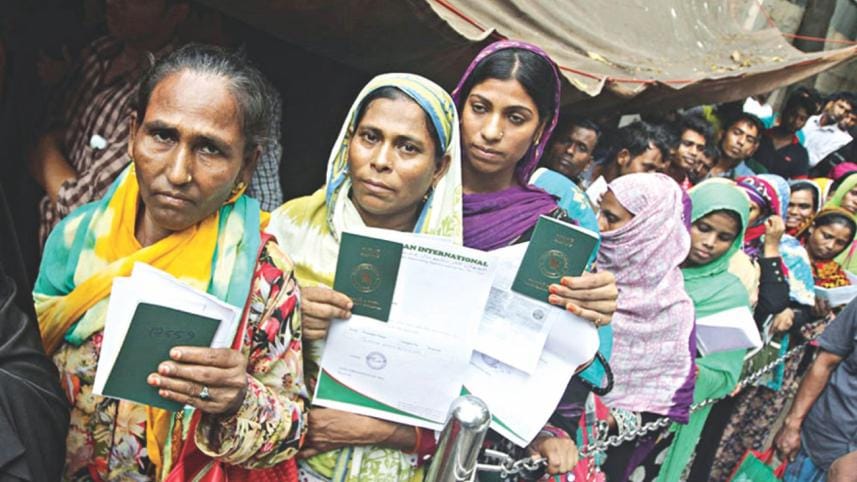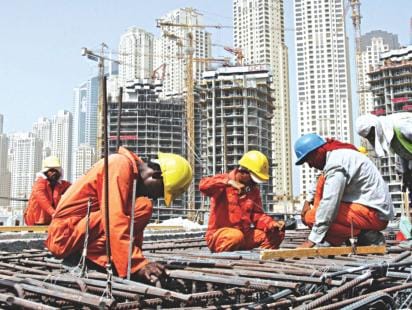Protecting migrants' welfare

Fatema, 20, the sole breadwinner of her family, migrated to Saudi Arabia in search of solvency. She purchased a ticket to her dream destination at the cost of Tk 20,000 though the actual cost was much higher. Much to her horror, her new workplace was not what she expected: She experienced attempted rape and spent several nights in a locked bathroom. She witnessed a battered Bangladeshi domestic worker being pushed out through the window after she refused to work. She soon realised that she was not the only one in such a miserable state. Her efforts of returning to Bangladesh consistently failed for a long time. However, Fatema was fortunate enough to be able to contact one of her cousins in Kushtia over the phone. She was probably one in a thousand female migrant workers who got so lucky. She also managed to reach out to Ain o Salish Kendra (ASK) through Human Rights Defender Forum (HRDF). Although her miserable days of torture have now come to an end, she is barely out of the trauma she has experienced.
Fatema is one of the million migrant workers who go to several destination countries every year with the hope of a better life. According to a recent global estimate, there are around 247 million international migrants in the world of which 48 percent are women. Source countries benefit significantly from labour migration as migrant workers' contribution to the global economy accounts for nearly USD 600 million of which USD 441 million goes to the developing countries.
The percentage of South-South migration is about 38 percent of all migration. Bangladesh is one of the top five migrant-sending countries in the world; when it comes to remittance, it is one of the top ten recipient countries. According to Bureau of Manpower Employment and Training (BMET), the total number of Bangladeshi labour migrants is about 11.46 million of which Saudi Arabia alone receives 29 percent. Female workers constituted around 12 percent of the total migrants in 2017.
Migration issues started to get preference in dialogues and actions for better policy framework and international cooperation. Currently, most countries including Bangladesh are in the process to reach a consensus on safe, dignified and orderly migration. At the same time, policymakers are showing greater interest in labour migration issues and different stakeholders are advocating for the rights of migrant workers. In 2016, remittance consisted of more than seven percent of the country's GDP and was higher compared to the aggregate contribution of agricultural, industrial and service sector which is about 6.5 percent. On top of that, a recent study by BMET suggested that remittance has significantly contributed to poverty reduction in Bangladesh and poverty ratio fell to 50 percent in 2000 from 70 percent in 1970. Besides, because of existing export potential of human resource and insufficient facilities to generate new jobs for the growing economy, migration has become one of the primary concerns and the best return on investment for the government of Bangladesh.

ACUTE SITUATION OF BANGLADESHI MIGRANT WORKERS
The World Employment Social Outlook 2017 suggested that one of the major challenges in South Asia is the low female labour force participation where only 28 percent women actively participate in the labour market. About 81 percent of these women are in vulnerable forms of employment. While the benefits of labour migration are well-recognised the sector faces a range of challenges leading to increased vulnerabilities for migrants. The vulnerabilities faced by migrant workers are acute in both the country of origin and the destination country.
Looking at the nature of the problems faced by overseas migrant workers, three different strands can be identified. During the pre-departure stage, most of the migrant labour face problems like relatively high cost of migration, corruption and trickery, low skills, informal or verbal agreement, and vague understanding of the culture of the destination countries. A study conducted by Transparency International Bangladesh (TIB) revealed that the cost of overseas migration is higher than the government-fixed rate which often benefits the brokers at both the origin and destination countries.
The report which came out last year stated, “A migrant worker has to spend up to Tk 1.2 million from about Tk 500,000 to go to Saudi Arabia with a job whereas the government has fixed the cost at Tk 165,000. To migrate to Malaysia, Singapore and some other Middle Eastern countries, a worker has to spend up to Tk 800,000 from a minimum amount of Tk 250,000.” Secondly, corruption at almost every stage of the recruitment process and fraudulent brokers remain substantially unaddressed. To afford the high cost migrant workers either sell whatever little asset they have or borrow money on lofty interest. In addition to these, procedural difficulties, delayed and very long recruitment process, and verbal and informal agreement of employment intensify the vulnerability of migrant workers. Also, most of the pre-departure training focuses on hard skills whereas soft skills are essential for their survival in the destination countries. Oftentimes, they have minimum understanding of the culture which leads to problems related to food habits, accommodation, mobility, day-to-day challenges, and so on.
During migration, the workers encounter troubles related to air travel and payment; faceissues that violate their basic needs and rights; face gender-based violence; and so forth. Many a time migrant workers are found roaming around the airport, uncertain of their journey. While some of them manage to fly to their destinations, some are taken advantage of by deceitful people.
Upon their arrival, their problems are intensified as they barely understand the language and are not accustomed with “different” food. The informal agreement of employment allows the employers in the destination countries to harass them. Workers regularly complain about non-payment, underpayment, and delayed payment. There are several cases where after arriving in the host country, the earlier agreement is substituted by a new agreement which has low wages, substandard accommodation, no provisions for food and other lower fringe benefits. In case of an accident leading to the worker's death, it takes years to get compensation by the next of kin due to complex legal procedures of the host countries. Sometimes workers are repatriated after becoming handicapped temporarily or permanently due to accidents without getting proper treatment or compensation. Workers are also denied air tickets at the time of exit and often, their sponsors in the destination country do not adhere to the terms and conditions of employment.
Lack of awareness about labour rights at the countries of destinations creates an environment of ill treatment of migrant workers by their employers. Poor living standards, inadequate health security, and hazardous nature of work endanger the health of migrant workers. They suffer from sickness, depression and gradual decrease in employability. In recent years the number of migrant workers returning deceased kept rising; in 2014, around 3,335 Bangladeshi workers returned deceased, and in 2015 the number reached 3,375. However, the actual number of the deceased could be higher than these figures since the sources in Bangladesh missions abroad have disclosed that at least one-third of the migrants who die are buried abroad. Furthermore, lack of exposure to career development measures means that migrant workers fail to sustain employability and most of the time get engaged in the low-income sectors only.
Female migrant workers in particular go through multidimensional issues in the destination countries. They have to work for unlimited hours in the household in exchange of very low pay. They are sometimes victims of sexual harassment. In January 2018, a number of female domestic workers who were abused returned home from Saudi Arabia and a number of them were in a safe home in Riyadh waiting to be repatriated. In 2017 Ain o Salish Kendra (ASK), a human rights and legal aid organisation, received a number of applications from family members which indicates the horrible situation many female migrants are in. ASK managed to help some of these female migrants with the help of the Ministry of Foreign Affairs of Bangladesh, human rights organisations, and the high commission/embassy in the host countries. Most of them have fallen victim to human trafficking and have endured torture beyond description at the hands of their employers.
Some of them are “fortunate” since they were able to escape the torture, humiliation, sexual harassment, sexual violence, and modern-day slavery-like conditions. But there are hundreds whose stories are unknown to us, who may have found that they were cheated but could not find a way out. ASK also received some applications where the family members said they had not been in contact for years with their female relatives abroad. In order to advocate for the rights of the Bangladeshi migrant workers in the destination countries, it is imperative that we first understand and acknowledge the various difficulties that Bangladeshi workers face abroad.

PROTECTION OF MIGRANT WORKERS' RIGHTS
Most of the reports on migration in Bangladesh focus on the economic gains of the country while some proudly utter the total number of overseas migrant workers. Merely pushing them out of the borders can neither be an indicator of success nor a sustainable solution. However, various policies and legislations are in place to protect and uphold migrant workers' rights as global citizens instead of treating them as commodities of the migration process. It is crucial to create awareness on this particular aspect of migration. There is a lack of clear procedural guidelines in the case of overseas migration. However, to ensure the protection of migrants' rights and their awareness, effective and timely measures should be taken.
We strongly believe that evidence of even one tortured migrant in sending and/or receiving countries is a crime and severe violation of human rights that any state should be concerned about.
One of the key priorities ought to be signing of bilateral accord or memorandum of understanding (MoU) with labour-receiving countries with clear directions on employment conditions (working hours, rest and recreation, wages, overtime, leave, healthcare services, freedom of movement) and legal support for the workers; those who are already facing some of these issues should be entitled to foremost considerations. Lobbying with the host government for monitoring violations of contract by employers and recruiting agents, facilitating legal support, collecting compensation of the deceased, and providing shelter to those who are in need can ensure progress.
There is a need for specific arrangement to look after the welfare of migrant workers including visiting their workplaces, responding to their queries and complaints, and extending consular services to expatriate workers. Measures are required to increase financial assistance for stranded workers waiting to be repatriated, emergency treatment for the distressed, and burial of the deceased workers abroad.
Current pre-departure training and orientations are not adequate for migrant workers, in particular for women migrants. The content is heavy on hard skills development, such as how to use machines. However, it is a timely demand to improve the soft skills of migrant workers, e.g. orienting them on the kind of behaviour and culture to expect in a destination country, food habit, human rights issues of migrants, and so on.
Considering the country-specific situation, women migrants must be made aware of the safety and security measures abroad, especially protective measures on violence against women and sexual harassment. Secondly, the materials that are used for pre-departure briefing such as booklets and leaflets should be more user-specific considering the literacy level of the migrant workers. Using simple, easy audio-visual communication materials can be useful for migrants in the classroom. They can keep these materials with them even at the workplace.
In addition to these, the following immediate measures can significantly improve migrants' human rights situation: (i) Visible strong political will to support migrants for their safe, quality and dignified (both for individual and for the country) migration as opposed to the existing modern-day slavery-like means to earn income, (ii) Providing full support in the GCM (Global Compact on Migration) process which reflects the voices of and advocates at the grassroots, (iii) Reviewing migration process to reduce cost and stop
harassment in the process, (iv) Finding alternate markets as countries of destinations and reduce dependency on Middle Eastern countries to send women migrants as domestic or other workers, (v) Emphasising more on skills-building of migrant workers in areas of hard skills (language, machine handling, etc.) and softer skills (attitudes, behaviour, human rights, access to justice and redressal of violence against women and sexual harassment), (vi) Strengthening pre-departure and pre-decision programmes considering the cultural context of both sending and destination countries, as well as the knowledge, information and awareness needs of the migrant workers, (vii) Educating/ equipping women migrants with multiple internet-based types of communication and connectivity mechanisms (e.g. browsing social media, etc.) for confidence-building and personal safety, (viii) Enhancing skill of negotiation and research capacity of the policymakers as such to make the memorandum of understanding or contracts with destination countries transparent and accountable to the citizens, (ix) Strengthened networking with destination countries, using diaspora community as a connection with the Bangladeshi migrants abroad, and (x) Importance of being informed, responsive, caring and respectful towards migrants should be embedded in the training and the appraisal process for the embassy staff responsible for migration.
Sheepa Hafiza is an equality and rights activist, and executive director of Ain o Salish Kendra (ASK).




 For all latest news, follow The Daily Star's Google News channel.
For all latest news, follow The Daily Star's Google News channel.
Comments